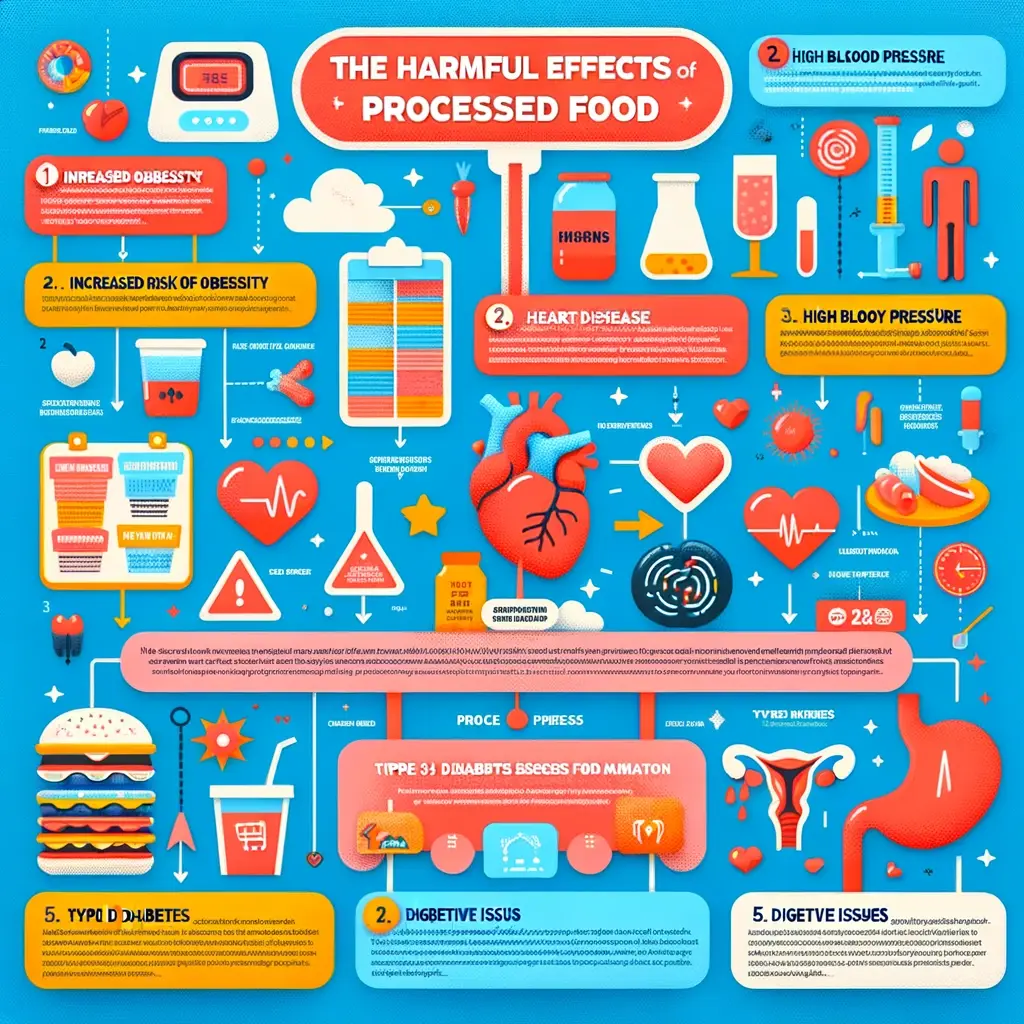Introduction
In the fast-paced rhythm of today’s lifestyle, fast and processed foods have become a dominant part of the American diet, offering convenience and instant gratification. While these foods are widely popular, there lies a less discussed aspect: the hidden dangers associated with their consumption. This article aims to peel back the layers of these everyday food choices, offering insights into what really goes into our fast and processed meals and how they impact our health.
Understanding Fast and Processed Foods
To begin, let’s define what we mean by fast and processed foods. Fast foods are typically meals that are prepared and served quickly at outlets known for their efficiency, such as fast-food restaurants. These include items like burgers, fries, and fried chicken. Processed foods, on the other hand, are those that have been altered from their natural state for safety reasons or convenience. Examples range from frozen meals and canned vegetables to snacks like chips and cookies.
Historically, the rise of fast food and processed food industries in the U.S. can be traced back to the early 20th century. This growth was fueled by industrialization, which brought about changes in lifestyle and food production. Fast food restaurants and processed food manufacturers capitalized on the growing need for convenience and speed, leading to a booming industry that has significantly shaped the American diet.
Nutritional Analysis

A closer look at the common ingredients in fast and processed foods reveals why they may be harmful to our health. A key concern is the high level of sodium found in these foods, which can lead to increased blood pressure and heart disease. Additionally, they often contain trans fats, which are artificial fats linked to heart disease and stroke. Added sugars are another culprit, contributing to obesity, type 2 diabetes, and dental problems.
Preservatives, which are used to extend the shelf life of processed foods, can also pose health risks. While they prevent food spoilage, some preservatives have been linked to adverse health effects, including allergic reactions and potentially increased risk of certain cancers.
In summary, while fast and processed foods are convenient and satisfy our immediate hunger, they come with a cost to our health. By understanding what these foods are made of and the potential risks they pose, we can make more informed choices about our diet and well-being.
Health Impacts

The consumption of fast and processed foods has both immediate and long-term health consequences that are crucial to understand. In the short term, these foods can lead to indigestion, fatigue, and spikes in blood sugar levels. These immediate effects are often a result of high sugar, fat, and sodium content, which can overwhelm the body’s digestive and metabolic processes.
In the long term, the implications become more severe. Regular consumption of these foods significantly contributes to the prevalence of obesity, a major public health issue in the U.S. Obesity, in turn, is a risk factor for a range of chronic conditions, including heart disease, diabetes, and various forms of cancer. Heart disease, often linked to the high trans fat and sodium content in these foods, remains one of the leading causes of death in the country.
Additionally, the incidence of type 2 diabetes has been on the rise, correlating with increased consumption of high-sugar, processed foods. These foods cause rapid spikes in blood sugar, leading to insulin resistance over time.
Statistical data and studies have consistently supported these claims. For instance, a study published in the Journal of the American Heart Association found a direct association between the consumption of fast food and an increased risk of heart disease. Similarly, research in the Journal of Nutrition has linked high processed food intake to obesity and metabolic syndrome.
Psychological and Social Factors
The appeal of fast food is not just about the taste; it’s deeply rooted in psychology and social factors. Fast food outlets, with their bright colors, tempting menus, and strategic marketing, tap into our desire for instant gratification. The combination of convenience, affordability, and taste makes it an attractive option, especially in a fast-paced society where time is a luxury.
Moreover, there are significant social implications linked to fast food consumption. It tends to be more prevalent in areas with limited access to fresh, wholesome foods – often termed ‘food deserts’. These are typically lower-income areas, suggesting a socio-economic dimension to the fast food epidemic. This accessibility issue creates a cycle where unhealthy eating habits become the norm in certain communities, further exacerbating health disparities.
In conclusion, the health impacts of fast and processed foods are far-reaching, affecting individuals both physically and mentally. Understanding these effects is key to making healthier food choices and addressing the broader societal issues that drive the consumption of these foods.
Case Studies and Real-Life Stories
The real-life implications of consuming fast and processed foods are best understood through personal stories and case studies. For instance, John, a 45-year-old office worker, shared his experience of how a diet predominantly consisting of fast food led to significant weight gain and high blood pressure. After years of relying on convenient food options due to his busy schedule, John faced a health scare that prompted him to reconsider his dietary choices.
In an interview, a registered dietitian, Dr. Emily Smith, recounted numerous cases where patients significantly improved their health by reducing their intake of fast and processed foods. Dr. Smith emphasized that while the effects of such a diet can be detrimental, the body’s ability to recover and improve health outcomes with better nutrition is remarkable.
Alternatives and Solutions
Moving away from fast and processed foods can be challenging, but there are practical and attainable steps one can take. The first step is awareness – understanding the negative impacts of these foods and the benefits of healthier alternatives.
- Healthy and Affordable Alternatives: Replace fast food meals with healthier options like salads, grilled lean meats, and whole grains. Opt for fruits, nuts, or yogurt for snacks instead of chips or cookies. These alternatives are not only nutritious but can also be budget-friendly, especially when purchased in bulk or in season.
- Meal Planning and Cooking at Home: One of the most effective strategies is to plan meals in advance. This reduces the temptation to opt for fast food due to a lack of prepared meals. Cooking at home allows for control over ingredients and portion sizes, ensuring a healthier diet. Simple, quick recipes can be as convenient as fast food but much more beneficial health-wise.
- Making Healthier Food Choices: Start by making small changes. If fast food cannot be completely avoided, opt for the healthier items on the menu. Gradually increase the intake of vegetables and fruits, and choose water over sugary drinks.
In summary, while the journey to transitioning away from fast and processed foods requires effort and commitment, the health benefits are substantial. Incorporating these practical tips into daily life can lead to lasting positive changes in one’s health and overall well-being.
Conclusion
As we have explored, fast and processed foods, while convenient and often tasty, come with a significant cost to our health. From immediate effects like indigestion and fatigue to long-term consequences such as obesity, heart disease, and diabetes, the dangers are both real and alarming. The psychological and social factors that drive our consumption of these foods add another layer of complexity to the issue.
However, the journey towards healthier eating habits is not only possible but also rewarding. By being aware of the pitfalls of fast and processed foods and making deliberate choices to incorporate healthier alternatives, we can profoundly impact our well-being. It’s about making small, manageable changes—choosing a salad over a burger, cooking a simple meal at home instead of ordering takeout, or opting for fruit instead of a sugary snack.
This shift doesn’t happen overnight, and it’s important to be patient and forgiving with oneself through the process. Each small step towards healthier eating is a victory worth celebrating. Remember, it’s not about perfection; it’s about progress.
As readers, you have the power to make these changes. Be mindful of your food choices. Think about what you’re eating, why you’re eating it, and how it affects your body and mind. You have the opportunity to shape your health and future through the foods you choose to consume.
Let’s commit to being more conscious of our dietary choices, not just for our health but for the wellbeing of our families and communities. Together, we can create a healthier, happier society, one meal at a time.


